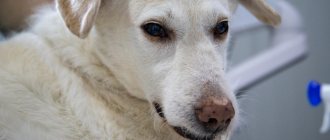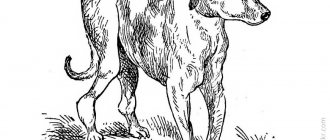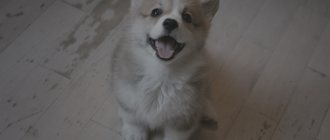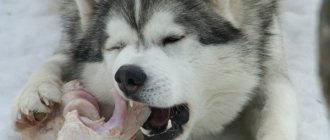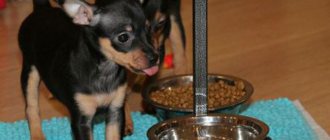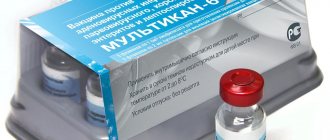Beginning dog breeders are often frightened by the phenomenon of hiccups in dogs. Although such a breathing disorder in an animal can occur for a variety of reasons and manifest itself in both puppies and adult dogs. Moreover, veterinarians advise owners not to worry too much about their pet if the hiccups last a short amount of time. And vice versa, urgently take him for examination if the dog hiccups continuously for 2-3 hours in a row, since in this case the phenomenon can act as a symptom of a serious pathology. The article will discuss the causes of hiccups, as well as methods of its treatment and prevention.
Non-Dangerous Causes of Hiccups in Puppies and Dogs
Hiccups occur due to convulsive contraction of the diaphragm. This muscle is located just below the ribs and separates the lungs from the abdominal cavity. As a result of a series of sharp jolts, the animal's breathing is impaired. Breaths become too short and intense.
A short-term disruption is not dangerous. It has no consequences for the body and goes away on its own. It is caused by 6 reasons.
Frozen
Decorative breeds with a poorly developed undercoat often hiccup after walks in the winter season. This occurs from hypothermia. Warm overalls and shorter trips outside will help get rid of hiccups.
A draft in the house can lead to a similar situation. If your pet is poorly protected by its own fur, place its sleeping place away from windows and do not allow it to sleep directly on the floor.
Swallowed food too quickly
If a puppy hiccups after eating, he swallows it too quickly or overeats. In the first case, hiccups are provoked by excess air swallowed along with food, and in the second, by an overfilled stomach pressing on the diaphragm.
The same picture is observed due to an excess of dry food in the diet. When feeding dry food, it is very important to ensure that your pet drinks its quota of water. As a result of dehydration, the mucous membranes dry out, irritating the nerve fibers of the muscular septum.
Entered a phase of active growth
Short-term hiccups are typical for puppies that have entered the active growth phase. Veterinarians suggest that with its help animals strengthen the muscles of the respiratory and digestive systems.
As the baby gets older, the frequency and duration of hiccups gradually decrease. The disorder is observed until the age of 14 months.
Slept in an uncomfortable position
An uncomfortable sleeping position can lead to pinching of the vagus nerve. It passes through a narrow hole in the diaphragm and is responsible for its contraction.
Ran around briskly
Drying of the nasopharynx occurs not only due to lack of water, but also due to high physical activity. If your dog starts hiccupping after outdoor games, give him something to drink.
Scared
With sudden fear, a sharp breath is taken, disrupting breathing. In this regard, pets often begin to hiccup during a thunderstorm or after firecrackers explode.
Prevention measures
If hiccups persist for a long time, take your dog to a specialist for examination. Such measures are justified, since if something happens, the owner will be prepared for aggravation of symptoms and will be able to provide prompt assistance to the pet. After a complete diagnosis of the dog, the veterinarian may prescribe medications such as Cerucal (blocks receptors that cause uncontrollable muscle spasms) or Seduxen (eliminates excessive sensitivity of the animal’s nerve endings).
In addition, the owner is obliged to monitor the feeding standards of his pet. Under no circumstances should you give him too hot food; this not only spoils his sense of smell, but can also cause hiccups. Form the portion based on the size and weight of the animal. Overfeeding has an extremely negative impact on the health of dogs. If a dog eats dry food, there should always be a sufficient amount of clean water nearby so that he can quench his thirst. Puppies up to 5-6 months old are given industrial food only after they have been soaked in liquid.
You should not ignore hiccups, as this phenomenon is not as common as it might seem at first glance. The owner should try to eliminate it himself, and if this does not work, then take the animal to be examined by a doctor.
Why does a dog or puppy hiccup: dangerous reasons
The presence of pathology in a dog is indicated by frequent and prolonged hiccups. It is a symptom of disorders in the functioning of the respiratory system, central nervous system and gastrointestinal tract. In most cases, the condition is complemented by concomitant symptoms:
- cough;
- snoring;
- rapid breathing;
- trembling paws;
- loss of coordination;
- lack of response to external stimuli;
- indigestion;
- increased gas formation.
Pathological attacks last from 2 hours to a whole day. In such a situation, it is recommended to contact a veterinary clinic as soon as possible. This duration is fraught with cerebral stroke or myocardial infarction.
Gastrointestinal problems
Problems with the gastrointestinal tract are accompanied by hiccups, licking, diarrhea and nausea. There are quite a few possible causes of discomfort:
- parasites;
- enzyme deficiency;
- pancreatitis;
- gastritis;
- gastric erosions and ulcers;
- food poisoning;
- intestinal obstruction.
In all these cases, the gastric mucosa is affected, which affects the vagus nerve. An accurate diagnosis can only be made after a full examination at a veterinary clinic.
Aperture problems
Constant contraction of the diaphragm is characteristic of bronchitis, pneumonia, allergies and asthma. When the respiratory tract is affected, the symptoms are complemented by snoring, coughing and intermittent breathing.
Injuries
Separately, it is worth noting the stuck foreign object. Most often it is accompanied by profuse drooling, discomfort and whining. With such a symptom, it is recommended to immediately go to the veterinary clinic, since too sharp edges can injure the mucous membranes and organs.
Diabetes
Advanced diabetes mellitus leads to damage to all elements of the nervous system. Excess glucose poisons the body, irritates the nerves and causes hiccups.
Infections
In addition to diabetes, infections cause extensive intoxication of the body and damage to the nervous system. Most often, plague, enteritis, meningitis and encephalitis are to blame. The patient develops the following symptoms:
- unusual behavior (aggression or apathy);
- paralysis of limbs;
- heat;
- convulsions;
- photophobia;
- epilepsy attacks;
- problems with coordination;
- partial or complete paralysis.
Infections that affect the central nervous system are very difficult to treat. Many infected animals die from suffocation or cardiac arrest.
Side effects of drugs
Toxic hiccups develop not only due to parasites and infections, but also due to the action of certain medications. These include chemotherapy drugs, steroids, and some anesthetics used in epidural anesthesia.
Growing pains
Some experts believe that hiccups are normal for a puppy. They call this phenomenon Episodes of (short and infrequent) hiccups as the puppy goes through all stages of psychological and physical development are considered normal. The older the animal gets, the less often this happens.
There is an opinion that hiccups are a kind of rudimentary reflex of puppies that remains with them from the time they were in the womb. In this way they can strengthen the muscles of the esophagus and lungs while they are supposedly “under water”. If the hiccups last no more than an hour, then there is no particular cause for concern.
What to do if your dog or puppy hiccups
If the reason why the dog hiccups is known, then the tension in the diaphragm can be relieved yourself. This applies only to those cases where the danger to the life of the animal is completely excluded.
To stop hiccups, rely on its cause:
- Hypothermia. Feed your pet warm broth and cover with a blanket.
- Fast absorption of feed. Place the puppy on its hind legs so that all the excess air comes out with the burp. After this, give him a light circular tummy massage, moving clockwise.
- Active growth phase. Here you just have to wait until the four-legged one gets older.
- Pinched vagus nerve during sleep. Carefully change the dog's position. Compression occurs due to maintaining a motionless posture for a long time. Just moving a little is enough to relieve the tension. If your pet has already slept, play ball with him.
- Increased physical activity. Allow the animal to catch its breath and drink water to replenish its depleted reserves.
- Fright. Pet your pet and treat him with a treat. Most animals quickly forget about the unpleasant, switching to treats.
After following these steps, the hiccups should disappear within a few minutes. If this does not happen, contact your veterinarian.
Elimination methods
For short-term dog hiccups, it is permissible to use the following recommendations from veterinarians:
- If the factor that caused the hiccups was food, then the owner, to eliminate it, can try to do the following: give the pet warm water or give him a piece of refined sugar, and then pat his tummy.
- Take your pet by the two front paws and “dance” with him a little. This will not only distract your shaggy friend, but will also allow air to escape in the form of a burp.
- Puppies benefit greatly from a light and gentle abdominal massage. It relaxes the dog's muscles, which means the chance that the hiccups will go away will increase significantly.
- Dogs who have become hypothermic outdoors or at home in a draft will benefit from intensive warming. It will not only eliminate hiccups, but also protect your pet from colds.
- Intense physical activity is no less effective during such breathing problems. Engage your pet with active play or a short run.
- Classic methods include scaring the pet. However, animal psychologists advise doing it extremely moderately, so as not to provoke the dog into aggression or even more hiccups.
When to take your pet to the vet
Prolonged and frequent hiccups in dogs, which cannot be corrected and are accompanied by accompanying symptoms, require mandatory diagnosis. Due to the variability of possible causes, you will have to undergo a clinical examination and blood biochemistry, as well as undergo an ultrasound of the lungs and gastrointestinal tract.
Due to the high likelihood of complications such as heart attack and stroke, it is necessary to make an appointment with a cardiologist and neurologist. If nervous system instability is detected, your pet may be prescribed medications to reduce stress levels.
Height
Typically, puppies and young dogs are susceptible to hiccups. In very young babies this may be due to the preservation of the reflex in the first months after birth. Thus, hiccups strengthen the muscles of the esophagus and lungs. Seizures, if they last no more than an hour, are considered normal for animals while they are growing. The older the dog gets, the less often this happens.
Therefore, experts believe that during the period of physical and psychological development there is no need to worry about why the puppy hiccups. But if something is suspicious or the dog is lethargic, does not eat well, and hiccups appear frequently and last a long time, this is a reason to visit a doctor.
